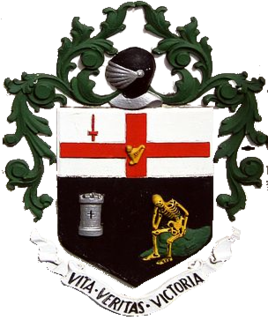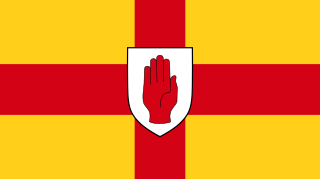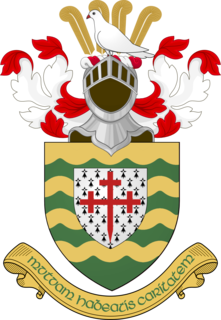
County Donegal is a county of Ireland in the province of Ulster. It is named after the town of Donegal in the south of the county. Donegal County Council is the local council and Lifford the county town.
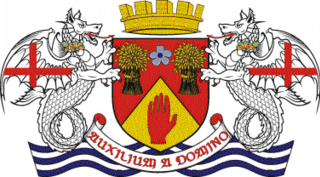
County Londonderry, also known as County Derry, is one of the six counties of Northern Ireland. Prior to the partition of Ireland, it was one of the counties of the Kingdom of Ireland from 1613 onward and then of the United Kingdom after the Acts of Union 1800. Adjoining the north-west shore of Lough Neagh, the county covers an area of 2,074 km² and today has a population of about 247,132.

City of Derry Airport is a regional airport located 7 mi (11 km) northeast of Derry, Northern Ireland. It is located on the south bank of Lough Foyle, a short distance from the village of Eglinton and 8 mi (13 km) from the city centre.

Derry City Council was the local government authority for the city of Derry in Northern Ireland. It merged with Strabane District Council in April 2015 under local government reorganisation to become Derry and Strabane District Council.

The Apprentice Boys of Derry is a Protestant fraternal society with a worldwide membership of over 10,000, founded in 1814 and based in the city of Derry, Northern Ireland. There are clubs and branches in Ulster and elsewhere in Ireland, Scotland, England, Australia and Toronto, Canada. The society aims to commemorate the 1689 Siege of Derry when Catholic James II of England and Ireland and VII of Scotland laid siege to the walled city, which was at the time a Protestant stronghold. Apprentice Boys parades once regularly led to virulent opposition from the city's Irish nationalist majority, but recently a more conciliatory approach has taken place and now the parades are virtually trouble-free. The 2014 'Shutting of the Gates' parade was described as "the biggest in years" and was violence-free.
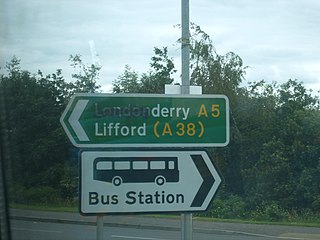
The names of the city and county of Derry or Londonderry in Northern Ireland are the subject of a naming dispute between Irish nationalists and unionists. Generally, although not always, nationalists favour using the name Derry, and unionists Londonderry. Legally, the city and county are called "Londonderry", while the local government district containing the city is called "Derry and Strabane". The naming debate became particularly politicised at the outset of the Troubles, with the mention of either name acting as a shibboleth used to associate the speaker with one of Northern Ireland's two main communities. The district of Derry and Strabane was created in 2015, subsuming a district created in 1973 with the name "Londonderry", which changed to "Derry" in 1984.

The Ryan McBride Brandywell Stadium is a municipal dual-use football and greyhound racing stadium located in Derry, Northern Ireland. It is the home ground of League of Ireland team Derry City F.C. and (temporarily) NIFL Premiership team Institute

Ballykelly is a village and townland in County Londonderry, Northern Ireland. It lies 3 miles (4.8 km) west of Limavady on the main Derry to Limavady A2 road and is 15 miles (24 km) east of Derry. It is designated as a Large Village and in 2001 the population of Ballykelly was 1,827. It lies within Causeway Coast and Glens district.
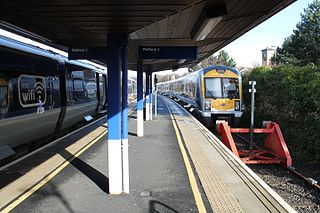
Londonderry Railway Station, known commonly as Waterside Railway Station, is a railway terminus in the city of Derry in Northern Ireland, on the east bank of the River Foyle. The station is also used by residents of the west of County Londonderry, much of west Tyrone and County Donegal. It is operated by Northern Ireland Railways. It serves the line to Belfast, whose other terminus is Great Victoria Street.
Ballyoan Cemetery is a cemetery in Derry, Northern Ireland.
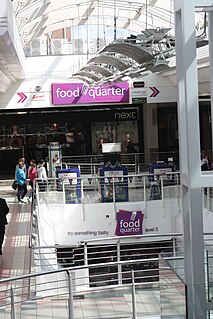
Foyleside Shopping Centre is a shopping centre in Derry, County Londonderry, Northern Ireland. Construction started in the early 1990s and the centre opened in 1995. The shopping centre's purpose was to offer a hub for shopping in the North West of Ireland.

The Waterside generally refers to the part of Derry on the east bank of the River Foyle. Traditionally, the Waterside ends at the Caw roundabout near the Foyle Bridge. Areas such as Eglinton and Limavady are not part of the Waterside.

The Belfast–Derry line runs from Belfast to Derry in Northern Ireland. The line is double-track on the short section it shares with the Belfast-Larne railway line, but is composed primarily of single track from Monkstown to Londonderry with passing points at Templepatrick, Antrim, Magherabeg, Ballymena, Killagan, Ballymoney, Coleraine and Bellarena.

In Ireland, the term city has somewhat differing meanings in Northern Ireland and the Republic of Ireland.

Londonderry and Strabane is a local government district that was created on 1 April 2015 by merging the City of Derry District and Strabane District. It covers most of the northwest of Northern Ireland. The local authority is Derry City and Strabane District Council.

The Foyle Valley Railway is a railway museum in Derry, Northern Ireland.

Gregory Lloyd Campbell is a Northern Ireland unionist politician, and the Democratic Unionist Party (DUP) Member of Parliament for East Londonderry. He has referred to himself as a loyalist.

An election to Londonderry Borough Council took place on Thursday 15 January 1920 as part of that year's Irish local elections.
The Derry Brigade also known as the South Derry Brigade of the Provisional Irish Republican Army (IRA) operated in Derry, County Londonderry, Northern Ireland, during the Troubles. The Derry Brigade along with the Belfast Brigade, East Tyrone Brigade and the South Armagh Brigade were the four most active IRA Brigade areas during the conflict between 1969 and 1998.


